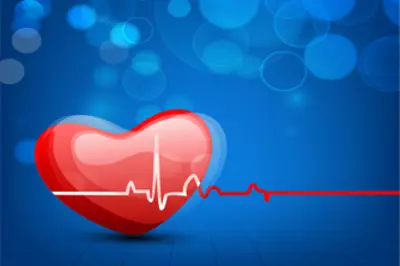Seeing Red: February is American Heart Month

Each February since 1963, the President has declared February "American Heart Month." This campaign urges Americans to become more aware of the severity of heart disease and to change their lifestyles so that heart attacks and cardiovascular disease become less common.
Here are some grim statistics from the CDC:
- Every 39 seconds, an adult dies from a cardiovascular disease such as a heart attack or stroke.
- Cardiovascular diseases kill more than 800,000 adults in the US each year.
- Of these, 150,000 are younger than age 65.
This month, educate yourself by learning everything you can about heart disease and how to prevent it.
Signs and symptoms
Don't rely on your memory of movie actors clutching their chests and falling over immediately-heart attacks usually don't work that way. They begin as a mild discomfort in the chest. The discomfort escalates and is often described as pressure, squeezing, fullness, or pain. You may also experience pain in the neck, jaw, arms, back, or stomach, in addition to nausea, dizziness, and lightheadedness.
Fast action is crucial if you are having a heart attack-the longer you wait, the more you risk permanent heart damage or even death. Call 9-1-1 or have someone drive you to the hospital immediately.
Prevention is key
Does the above sound frightening? The good news is that it can be prevented.
- Don't smoke. Ever. If you do smoke, throw your pack away now and take some deep breaths. If you have trouble quitting, you might try hypnosis.
- Get physical. Every day. Even if it means walking your kids to school and then taking a few extra laps around the park on the way home, or bicycling to the grocery store instead of driving. Doing just 30 minutes of moderately intensive exercise each day can help protect your heart.
- Eat healthy foods. You wouldn't expect it, but some of the most heart-friendly foods are also the most delicious: salmon, tuna, spinach, tomatoes, and dark chocolate are a few examples. Doctors also recommend switching to fat-free dairy products and throwing away the high-cholesterol donuts and chips that you normally reach for.
- Be happy. Researchers found that happy people are 22% less likely to develop heart disease than people who experience anxiety, hostility, and anger in their daily life. Carve out at least 30 minutes a day during which you can do whatever it is that makes you who you are--knitting, jogging, painting, or playing Frisbee with your dog.
Using holistic therapies
If you do have cardiovascular disease, you should consult your healthcare provider before embarking on any course of treatment or prevention, but here are a few integrative therapies that work for some:
- Emotional and social healing practices, such as yoga and mindfulness
- Mind/body practices and stress reduction, such as guided imagery and biofeedback
- Botanicals and Supplements, such as Omega-3 supplements, garlic, hawthorne, or folic acid


